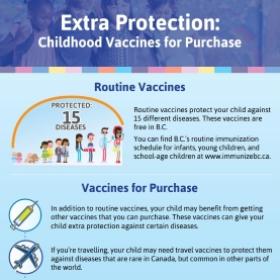On March 31, the ImmunizeBC website will move over to HealthLinkBC.ca After this date, you will be automatically redirected to HealthLink BC’s Immunization landing page. HealthLink BC provides trusted health information online and over the phone 24 hours a day, seven days a week by calling 8-1-1.
Date last reviewed:
Thursday, Jun 20, 2024
Fact
Did you know?
There are vaccines that you can buy to give your child even more protection.
In BC, children and teens are offered free vaccines (paid for by the BC government) to protect them against 15 different diseases. These are the vaccines that are part of the routine immunization schedule. In addition to these vaccines, there are other vaccines that you can buy to give your child protection against even more diseases.
Talk to your health care provider about additional vaccines you should consider for your child. Some health plans may cover the cost of some of these vaccines.
Examples of vaccines you can buy to give your child extra protection
- Meningococcal B vaccine
-
- The meningococcal B vaccine protects against meningococcal bacteria, type B.
- The bacteria can cause serious and life-threatening infections, including meningitis, an infection of the lining that covers the brain, and septicemia, an infection of the blood.
- You can buy the meningococcal B vaccine to protect your child against meningococcal B infection. The vaccine can be given to children 2 months of age and older.
- The vaccine is especially important for children with medical conditions that put them at high risk of meningococcal infection, such as those missing a spleen or poorly functioning spleen.
- The vaccine is also especially important for children traveling to an area experiencing an outbreak of meningococcal B disease.
- Children immunized in infancy may need to receive a booster dose later for continued protection.
- Note: in BC, this vaccine is free for people 2 months of age and older who have been in close contact with a case of meningococcal B disease.
- In recent years, this disease has been very rare in BC.
- Learn more about meningococcal vaccines.
- Meningococcal quadrivalent vaccine
-
- The meningococcal quadrivalent vaccine protects against 4 types of meningococcal bacteria: A, C, Y, and W.
- Although rare, the bacteria can cause serious and life-threatening infections, including meningitis and septicemia.
- The meningococcal quadrivalent vaccine is provided free to children in grade 9. However, if you would like your younger child to have the protection this vaccine offers, you can buy the vaccine for them.
- The vaccine can be given to children 2 months of age and older.
- The vaccine is especially important for children living or travelling in a high-risk area for meningococcal disease.
- Children immunized in infancy may need to receive a booster dose later for continued protection.
- Note: This vaccine is free for some children 2 months of age and older who are at high-risk of meningococcal disease due to certain medical conditions or who have been in close contact with a person with meningococcal disease.
- Learn more about the meningococcal vaccines.
- HPV vaccine
-
- The HPV vaccine protects against HPV infections that can cause cancers of the cervix, anus, mouth and throat, vagina, vulva, and penis. It also protects against genital warts.
- Most males born before 2005 are not eligible for the free HPV vaccine. However, the vaccine is recommended for males up to 26 years. If your child was born before 2005, you can buy the vaccine for them.
- Note: The HPV vaccine is routinely given to children for free in grade 6. Males (born in 2005 or later) and females who did not get the vaccine in grade 6 can still get the vaccine for free if they get their first dose before they turn 19 and their last dose before they turn 26.
- Learn more about the HPV vaccine.
- Hepatitis A vaccine
-
- The hepatitis A vaccine protects against hepatitis A, an infection of the liver caused by the hepatitis A virus.
- The hepatitis A vaccine is often thought of as a travel vaccine only, but the hepatitis A virus can be transmitted at any time or place.
- If you want your child to have protection against hepatitis A, you can buy the vaccine. The hepatitis A vaccine can be given to children 6 months and older.
- Note: The vaccine is free for Indigenous children and adolescents and for others at high risk of infection or severe illness from hepatitis A.
- Learn more about the hepatitis A vaccine.
- Travel vaccines
-
- If your child is travelling, it’s important that they get all the recommended and required vaccines before they go.
- The vaccines recommended for your child depend on factors such as their age, immunization history, and travel destination.
- The BC government does not fund travel vaccines. However, some vaccines recommended for travellers are part of the routine immunization schedule and are free (for example, the measles, mumps, and rubella vaccine and the hepatitis B vaccine).
- Learn more about travel vaccines.
Information
Helpful resources from the BC Pediatric Society
Find fact sheets on vaccines for extra protection on the BC Pediatric Society's website.
Answers to common questions about vaccines you can buy
- Where can I buy these additional vaccines?
-
You can buy these vaccines at most:
- Pharmacies (for those 4 years of age and older).
- Travel health clinics.
- How much do the vaccines cost?
-
The vaccine costs range from about $60 to $200 per dose (multiple doses may be required in a vaccine series). There may be extra fees for consultation, dispensing, and injecting. Vaccine costs vary throughout the province for the various types of vaccines, depending on where you get them.
- Will my health plan cover the vaccine cost?
-
An insurance company will have various plans, and your coverage will depend on the policy provided by an employer or other provider or that you may have paid for yourself. Here is some information to get you started:
- Neither MSP nor Pharmacare covers vaccines that the BC government doesn’t fund.
- Vaccines may be covered by an extended benefits plan from a private insurance agency. You should obtain the DIN (Drug Identification Number) from a pharmacy, then contact your private insurance agency to find out about this aspect of medical coverage.
- Government or private sector employees may have vaccine coverage in their benefits package. If this is your situation, check with your Human Resources Department (or equivalent in smaller organizations).
- If you are interested in coverage for vaccinations for a child attending a post-secondary institution, some institutions provide some vaccines as part of the student health plan. Ask the student to check with Student Health Services on their campus. If more than one dose is required, Student Health Services can schedule the vaccines to be given over different years of the plan to maximize the plan’s value.
- Why aren’t all vaccines free in BC?
-
In BC, the Ministry of Health makes decisions to fund vaccine programs based on recommendations from the Communicable Disease Policy Advisory Committee. This expert scientific committee looks at the following:
- Statements issued by Canada’s National Advisory Committee on Immunization.
- The published literature (studies about certain vaccines and diseases)
- The product monograph (information about the vaccine from the manufacturer)
- Local epidemiology (how often the disease occurs in different groups of people in the province).
- Available health economic analyses (an analysis of the costs and benefits of the vaccine).
Recommendations for new vaccine programs are then prioritized with other public health initiatives. As a result, not all vaccines approved for use in Canada are funded by the provincial government. People may choose to buy vaccines for extra protection.


